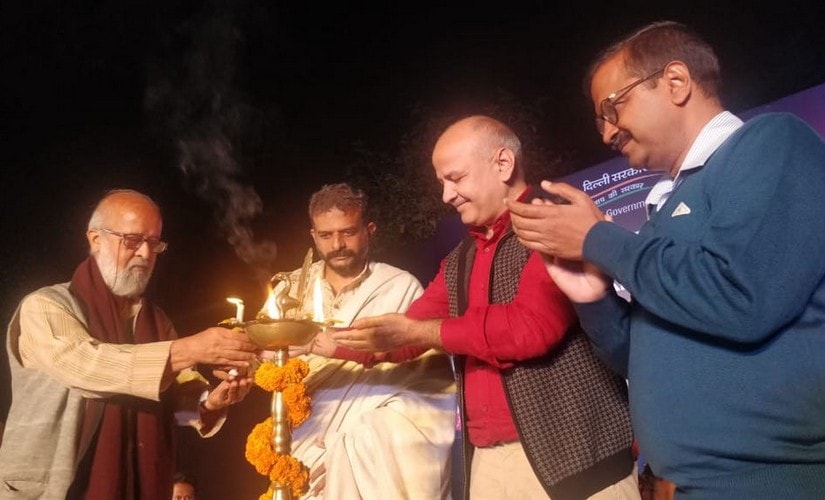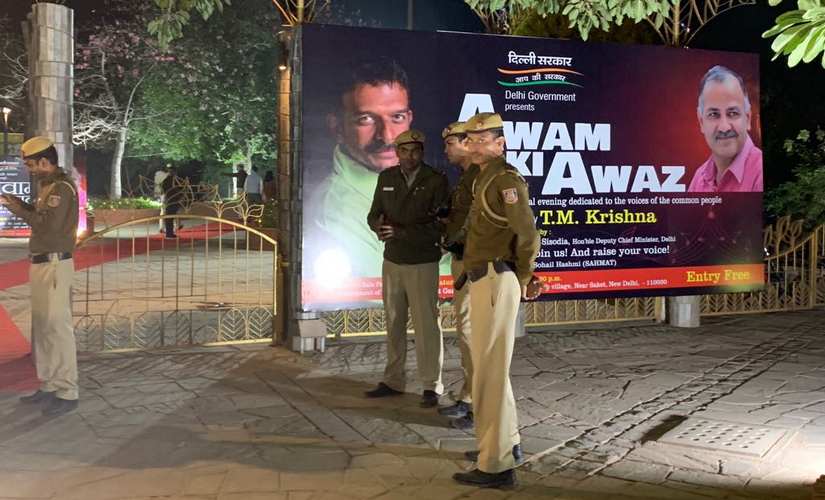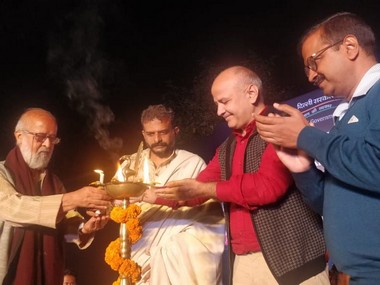On Saturday evening, the way leading up to the Garden of Five Senses, a twenty-acre garden located at South Delhi’s Said-Ul-Azaib village dotted with restaurants and open theatre venues, witnessed an unusual congestion. The drop off point for cars had been barricaded by the police, there were PCR vans with muted sirens parked by the edge of the slim internal road. Posters for a concert, titled Awam ki Awaz (voice of the people) featuring Carnatic singer TM Krishna, made repeated appearances from a kilometre away. An assembly of students wearing backpacks on fleece jackets and genuine enthusiasts of classical music were being put through security checks at the gate. Along with unwavering levels of PM2.5, it seemed like the capital’s air was now rife with threatened ideals of freedom. [caption id=“attachment_5570421” align=“alignnone” width=“825”] AAP organised a new TM Krishna concert, Aam Ki Aawaz, at Delhi’s Garden of Five Senses on Saturday, after the original event was scrapped by AAI. Pallavi Rebbapragada[/caption] The seating filled up quickly in the free-entry-for-all event organised by the Aam Aadmi Party; Several in the audience stood at a distance, climbed small trees and dispersed into dimly-lit corners of the gardens where they could only hear the sound of Krishna’s ragas blending into nameless percussion beats. Just few days ago, on 13 November, the Airports Authority of India had scrapped an event, titled Music in the Park, allegedly after the musician drew the ire of Hindu trolls on social media. Krishna had told Firstpost that until 4 pm on 13 November, the AAI was making extra security arrangements and asking them not to worry about the threats. Then suddenly, at 5 pm, an email citing ‘some exigencies of work’ was sent to Spic Macay, the organiser of the event that was to take place on 17 and 18 November at the Nehru Park. “We don’t know what is happening behind the scenes. But the trolling isn’t happening arbitrarily; obviously, there is a mechanism by which these things work,” he had told Firstpost. This was not the first cancellation. In September, Krishna was scheduled to perform at a temple at the Sri Siva Vishnu temple in Maryland, USA. But the concert was cancelled after he was accused of ‘Hinduphobia’ by some who objected to his singing of Christian hymns. But, the AAI, a large organisation that falls under the India’s Ministry of Civil Aviation, seemed to have succumbed to threats given on social media, thereby validating the seriousness of such threats and the possibility of Hindu radicals vandalising a musical concert in the heart of the national capital. [caption id=“attachment_5570411” align=“alignnone” width=“825”]
AAP organised a new TM Krishna concert, Aam Ki Aawaz, at Delhi’s Garden of Five Senses on Saturday, after the original event was scrapped by AAI. Pallavi Rebbapragada[/caption] The seating filled up quickly in the free-entry-for-all event organised by the Aam Aadmi Party; Several in the audience stood at a distance, climbed small trees and dispersed into dimly-lit corners of the gardens where they could only hear the sound of Krishna’s ragas blending into nameless percussion beats. Just few days ago, on 13 November, the Airports Authority of India had scrapped an event, titled Music in the Park, allegedly after the musician drew the ire of Hindu trolls on social media. Krishna had told Firstpost that until 4 pm on 13 November, the AAI was making extra security arrangements and asking them not to worry about the threats. Then suddenly, at 5 pm, an email citing ‘some exigencies of work’ was sent to Spic Macay, the organiser of the event that was to take place on 17 and 18 November at the Nehru Park. “We don’t know what is happening behind the scenes. But the trolling isn’t happening arbitrarily; obviously, there is a mechanism by which these things work,” he had told Firstpost. This was not the first cancellation. In September, Krishna was scheduled to perform at a temple at the Sri Siva Vishnu temple in Maryland, USA. But the concert was cancelled after he was accused of ‘Hinduphobia’ by some who objected to his singing of Christian hymns. But, the AAI, a large organisation that falls under the India’s Ministry of Civil Aviation, seemed to have succumbed to threats given on social media, thereby validating the seriousness of such threats and the possibility of Hindu radicals vandalising a musical concert in the heart of the national capital. [caption id=“attachment_5570411” align=“alignnone” width=“825”] Posters announcing the TM Krishna concert at Delhi’s Garden of Five Senses; Pallavi Rebbapragada[/caption] Krishna has expressed time and again that Carnatic music is the preserve of the upper castes, and through Christian, Islamic and Dalit insertions into the verses, he has asserted the need for social reform. He has, for instance, been critical of MS Subbulakshmi’s rejection of her own Devadasi roots for the sake of gaining the acceptance and admiration of the masses in a music genre obsessed with deities, Brahmanic rituals and the self-styled sainthood of the vaggeyakaras or the legendary composers whose experiments with ragas and talas never dared to break the social constructs. But, in what seemed like a double whammy for the AAI, the AAP-led Delhi government reinstated its own commitment towards social reform by publicly and enthusiastically backing Krishna’s activism, and thereby, succeeded in sending out a positive social message. Krishna, who had won the Ramon Magsaysay Award for “his forceful commitment as artiste and advocate to art’s power to heal India’s deep social divisions” in 2016 aligns himself with social causes through music and writing, and doesn’t mince his words. Delhi chief minister Arvind Kejriwal, who was present at the venue to welcome Krishna has also won the Magsaysay award in 2006 for activating India’s right to information movement in the grassroots. Both Kejriwal and his deputy Manish Sisodia described the presence of people at the concert as a ‘political statement’ needed to preserve the diversity of the country.
Posters announcing the TM Krishna concert at Delhi’s Garden of Five Senses; Pallavi Rebbapragada[/caption] Krishna has expressed time and again that Carnatic music is the preserve of the upper castes, and through Christian, Islamic and Dalit insertions into the verses, he has asserted the need for social reform. He has, for instance, been critical of MS Subbulakshmi’s rejection of her own Devadasi roots for the sake of gaining the acceptance and admiration of the masses in a music genre obsessed with deities, Brahmanic rituals and the self-styled sainthood of the vaggeyakaras or the legendary composers whose experiments with ragas and talas never dared to break the social constructs. But, in what seemed like a double whammy for the AAI, the AAP-led Delhi government reinstated its own commitment towards social reform by publicly and enthusiastically backing Krishna’s activism, and thereby, succeeded in sending out a positive social message. Krishna, who had won the Ramon Magsaysay Award for “his forceful commitment as artiste and advocate to art’s power to heal India’s deep social divisions” in 2016 aligns himself with social causes through music and writing, and doesn’t mince his words. Delhi chief minister Arvind Kejriwal, who was present at the venue to welcome Krishna has also won the Magsaysay award in 2006 for activating India’s right to information movement in the grassroots. Both Kejriwal and his deputy Manish Sisodia described the presence of people at the concert as a ‘political statement’ needed to preserve the diversity of the country.
Songs of defiance: With sudden scrapping of TM Krishna’s concert, AAI helps AAP score political point
Pallavi Rebbapragada
• November 18, 2018, 20:18:17 IST
The AAP government in Delhi reinstated its commitment towards social reform by publicly and enthusiastically backing TM Krishna’s activism, and thereby, succeeded in sending out a positive social message
Advertisement
)
The event was organised within two days by the Art, Culture and Language Department, which is part of the Education Department. After the AAI’s ungraceful exit from the scene, almost overnight, AAP put out a poster announcing a fresh concert on the 17th describing AAI’s move as textbook fascism, stating that it will not allow fascist forces to dictate what anyone can think or speak in this country and will help the common man speak his mind. The AAI has cited the reason for cancellation as “exigencies of work”, but a concert of this scale requires deploying money and resources. Rashmi Malik of Spic Macay, who was behind the signing of the MoU with AAI, had informed Firstpost that the list of artistes was jointly drawn by both the organisers. If Krishna’s name was added to the list and tweeted out by the AAI, why did it suddenly pull the plug on an event that has been going on since 12 years and took place in Jaipur on 10 November, where Krishna had performed. Now, had the AAI not maintained radio silence over the sudden scrapping of the concert and the speculations that it led to, social media noise would have remained on social media and Delhi audiences could have experienced the same performance with a little less angst at another venue.
End of Article